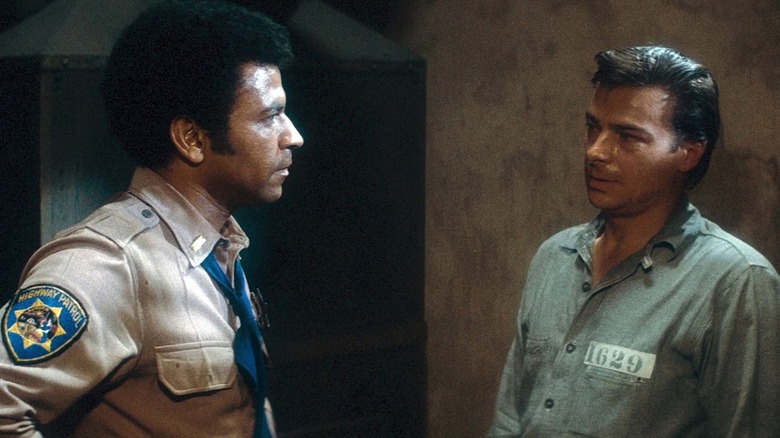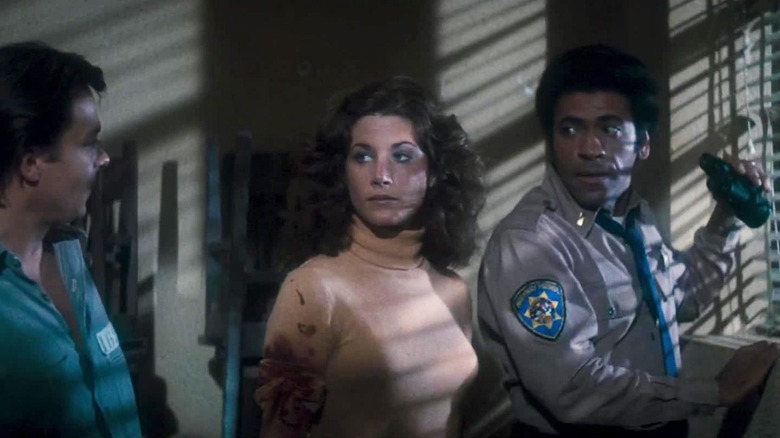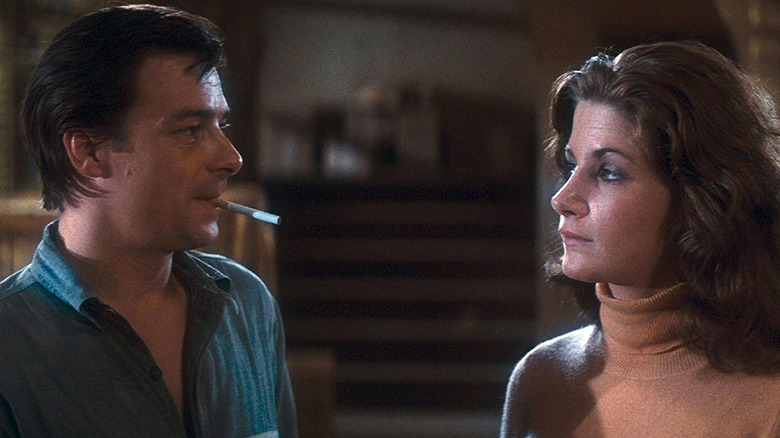The Siege In Assault On Precinct 13 Is The Best Action Scene Ever
(Welcome to Best Action Scene Ever, a column dedicated to breaking down the best, most effective action sequences throughout the genre. In this edition, we revisit the high water mark for one-location thrillers: the central siege in John Carpenter's 1976 classic "Assault on Precinct 13.")
There's a hypothetical version of "Assault on Precinct 13" out there that does away with the restraint and foreboding atmosphere of the original, recklessly tossed out in favor of high-wire thrills and a never-ending collection of narrative tropes. In place of a handful of straightforward (yet effective) archetypes thrown together as strangers but who come out as something else altogether after the crucible of one endlessly violent night, someone might've had the inclination to try and "humanize" these characters by burdening them with edgy backstories or an overcomplicated plot. In essence, imagine stripping away all the idiosyncrasy and personality just to end up with another generic action/thriller. Anyway, thankfully Hollywood had the good sense not to attempt a modern remake of this particular story, am I right?
The reason why the original "Assault on Precinct 13" continues to age magnificently while its 2005 remake quickly came and went is actually pretty simple. The fingerprints of John Carpenter (who wrote, directed, edited, and scored the film) are on every frame of the film — almost literally! Taking the thinnest of premises, where a defunct police precinct slated for relocation and the unsuspecting souls inside become the target of a formidable street gang's relentless siege over the course of one bloody night, Carpenter does what only he can and weaves together an unbearably tense ode to, of all things, old Westerns of yore.
And true to the film's title, the prolonged siege continues to stand out as one of the very best sequences in all of action.
The scene
For a film that's only an hour and a half long, newcomers to "Assault on Precinct 13" might be shocked by how long it takes Carpenter to actually get to the fireworks. A full 40 minutes pass before the first bullet is fired in the vicinity of the actual precinct, giving viewers every possible opportunity to settle into the nerve-fraying and almost paradoxically slow-burning siege. Incited by a deadly police raid on local gang Street Thunder, the near-silent gang members swear a blood oath early on to wage war indiscriminately on the streets of Los Angeles. Much has been made of the chilling ice cream truck scene, in which we have no choice but to watch in steadily mounting horror as an innocent girl (a young Kim Richards) is gunned down in a residential neighborhood. Bent on revenge, her grief-stricken father (Martin West) kills one of the combatants ... before he's forced to flee to the nearest safe haven, a derelict police precinct that's set to be decommissioned that very night.
For the rookie cop Ethan Bishop (Austin Stoker) recently put in charge of this unwanted assignment, terrified secretaries Leigh (Laurie Zimmer) and Julie (Nancy Kyes), and the busload of death-row inmates who just happened to make an impromptu stop earlier, the nightmare is only just beginning.
Why it works
In a stark difference from its genre contemporaries, "Assault on Precinct 13" sets itself apart through the pregnant pauses and eerie silences that frequently separate each wave of the siege. At first, the occupants can hardly even believe that anything is amiss — that is, until one cop ends up shot dead just outside the precinct doors and a rapid staccato of gunfire through the windows and walls forces everyone to the floor. But for those trapped inside, time isn't the only thing they're running out on. Trust is also in short supply, as the engine of the entire movie is fueled by the dynamics between the unexpected allies and uncomfortable bedfellows mixed up in the precinct. When they're not mowing down waves of intruders coming in through the windows and doors, the trio of the straight-laced Bishop, the wildcard Wells (Tony Burton), and dreamy-but-deadly Napoleon Wilson (Darwin Joston) are kept busy maintaining their uneasy truce among themselves.
The longer we go between attacks, the more likely it seems that the tension and stakes among our so-called good guys will prove to be their undoing.
By cutting off our characters from the outside world by a shutdown power grid and a devious enemy using every trick in the book to maintain appearances of normalcy, Carpenter twists the screws — and the irony of feeling such existential loneliness while located in the middle of a bustling city. When the script isn't taking direct aim at the incompetency of the police bureaucracy and the prison industrial complex, the bursts of violence hit that much harder as we watch this disparate group of individuals forged into a genuine team unit before our eyes. Almost without our even noticing, Carpenter conveys all sorts of character-focused storytelling through action.
The key moment
A funny thing happens when a group of people, herded together by mere circumstance, begin to realize that they might be the last faces they'll ever see. Bishop and Napoleon (who constantly promises to reveal the logic behind his unusual name in the moments before his death, but never does) reach a grudging respect as lawman and criminal — or, more accurately, sheriff and cowboy. But the real magic comes from the inmate's curiously smoldering interactions with the surprisingly hard-edged Leigh. As the siege kicks off, viewers fully expect to see cops and criminals alike spring into action, but Leigh's quiet sense of resolute determination keeps her alive on more than one occasion when the cult-like gang members begin to break into the building. And every time she dodges certain death, with only a grazed bullet to the shoulder to show for it, it's clear that she's earned Wilson's respect.
Nothing ever comes of this doomed romance, of course, as our heroes are finally funneled into a narrow hallway in a desperate retreat to the precinct basement. Having lost Wells in a desperate gambit to alert the cops and staring down a rapidly dwindling supply of ammo, Leigh wryly jokes that she ought to save her last two bullets for Wilson and herself ... which, between that and her payoff to Wilson's running gag of asking for a smoke, is pretty much all the consummation Carpenter ever allows the two.
In the closing moments, Bishop manages to detonate a tank of explosive gas and wipe out most of the invading gang. When backup finally arrives, Wilson knows what fate awaits him. After one last parting look at Leigh, he agrees to walk out with Bishop — one last stand, of sorts, after their own successful Alamo.


